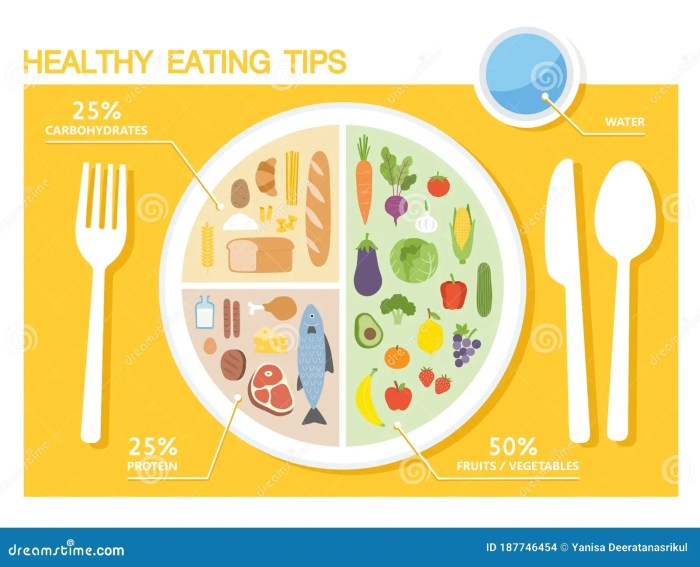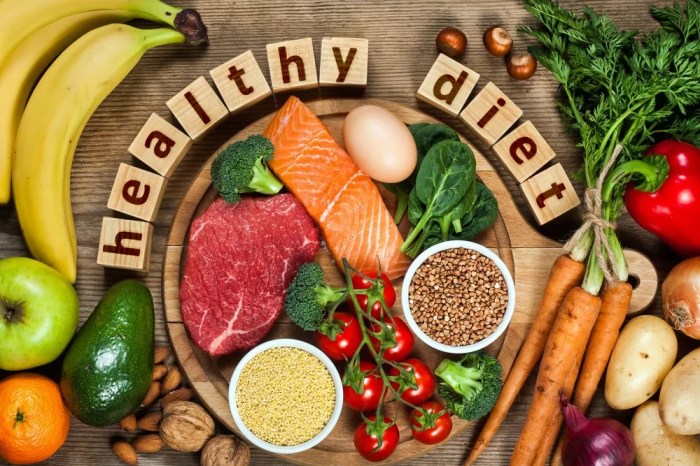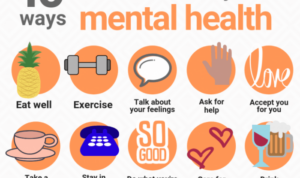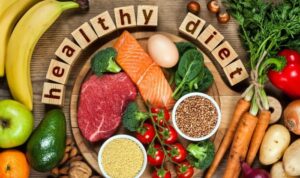Balanced Diet Tips, let’s break it down for you in a way that’s fresh and real. We’re talking about the lowdown on how to keep your body in top shape through what you eat.
From the basics of what makes a balanced diet to practical tips on how to make it happen, we’ve got you covered. So, buckle up and get ready to upgrade your health game!
Importance of a Balanced Diet: Balanced Diet Tips
Eating a balanced diet is essential for maintaining overall health and well-being. It provides the necessary nutrients, vitamins, and minerals that our bodies need to function properly and stay healthy. When we consume a variety of foods in appropriate portions, we support our immune system, energy levels, and overall vitality.
Benefits of Following a Balanced Diet
- Weight Management: A balanced diet can help regulate weight by providing the right amount of calories for energy without excess.
- Improved Digestion: Foods high in fiber, like fruits and vegetables, support healthy digestion and prevent digestive issues.
- Heart Health: Eating a balanced diet low in saturated fats and cholesterol can reduce the risk of heart disease and hypertension.
- Enhanced Mental Clarity: Nutrient-rich foods support brain function and cognitive abilities, improving focus and mental clarity.
Prevention of Health Conditions
- Diabetes: Maintaining a balanced diet can help regulate blood sugar levels and reduce the risk of developing type 2 diabetes.
- Osteoporosis: Adequate intake of calcium and vitamin D from a balanced diet can support bone health and prevent osteoporosis.
- Cancer: Eating a variety of fruits, vegetables, and whole grains can provide antioxidants that may help reduce the risk of certain cancers.
Components of a Balanced Diet

Eating a variety of foods is essential for maintaining good health. A balanced diet consists of several key components that work together to provide the necessary nutrients for our bodies to function properly. Let’s explore the essential components of a balanced diet and their roles in promoting overall health.
Carbohydrates
Carbohydrates are the body’s main source of energy. They are broken down into glucose, which is used by the cells for fuel. Good sources of carbohydrates include whole grains, fruits, vegetables, and legumes.
Proteins
Proteins are essential for building and repairing tissues in the body. They are made up of amino acids, some of which are produced by the body while others must be obtained from food sources. Foods rich in protein include lean meats, poultry, fish, eggs, dairy products, nuts, and seeds.
Fats
Fats are important for providing energy, supporting cell growth, and protecting organs. Healthy fats, such as monounsaturated and polyunsaturated fats, can be found in foods like avocados, nuts, seeds, and fatty fish. It is important to limit saturated and trans fats, which can increase the risk of heart disease.
Vitamins
Vitamins are essential for various bodily functions, including immune system support, energy production, and bone health. Different vitamins play different roles, and they can be found in a variety of foods. For example, vitamin C is found in citrus fruits, vitamin A in carrots, and vitamin D in fatty fish.
Minerals
Minerals are important for maintaining proper fluid balance, nerve function, and bone health. Examples of minerals include calcium, iron, potassium, and zinc. Foods like dairy products, leafy greens, lean meats, and whole grains are good sources of minerals.
Tips for Achieving a Balanced Diet

Eating a balanced and nutritious diet is essential for overall health and well-being. Here are some practical tips to help you achieve a balanced diet:
Plan Your Meals
Planning your meals in advance can help ensure that you are getting a variety of nutrients each day. Try to include a mix of fruits, vegetables, whole grains, lean proteins, and healthy fats in your meals.
Practice Portion Control
Pay attention to portion sizes to avoid overeating. Use smaller plates, bowls, and utensils to help control portion sizes. Remember that moderation is key when it comes to maintaining a healthy diet.
Incorporate Variety
Include a wide range of foods in your daily diet to ensure that you are getting all the nutrients your body needs. Try to eat foods of different colors, textures, and flavors to keep your meals interesting and nutritious.
Impact of an Imbalanced Diet
An imbalanced diet can have severe consequences on one’s health, leading to a variety of health issues and affecting different aspects of overall well-being.
Health Issues from Poor Dietary Choices, Balanced Diet Tips
Poor dietary choices resulting in an imbalanced diet can lead to several common health issues such as obesity, heart disease, diabetes, high blood pressure, and nutritional deficiencies. These conditions can significantly impact one’s quality of life and increase the risk of developing chronic illnesses.
Effect on Different Aspects of Health
An imbalanced diet can affect various aspects of health, including physical, mental, and emotional well-being. Physically, it can lead to weight gain or loss, fatigue, weakened immune system, and poor skin health. Mentally and emotionally, it can cause mood swings, lack of focus, and overall feelings of lethargy and low energy levels. Additionally, it can impact cognitive function and overall productivity.


